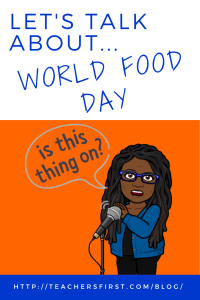Food. It’s one of our most basic human needs, yet nearly 690 million people still go hungry. As students and teachers, we have an opportunity – and a responsibility – to understand these global issues and spark change.
World Food Day on October 16th is the perfect time to engage students in learning that drives action. In exploring food sustainability, we can introduce young people to the UN’s Sustainable Development Goals in an authentic way. Students can construct knowledge by researching food waste, climate change, and equitable distribution. They can curate resources and make global connections to understand perspectives worldwide. This work builds empathy and computational thinking by analyzing the problem and designing solutions.
Students then have chances to communicate and demonstrate digital citizenship. They can share their learning through campaigns that inform others and provide food donations. Video projects, fundraisers, and volunteerism offer real-world ways to increase awareness and feed those in need.
As an educator, facilitating this type of learning is extremely rewarding. In this post, we’ll explore five impactful ways your students can honor World Food Day while developing critical skills. The goal is to inspire a passion for building a better world. Are you ready to get started?
Helping Students Understand the Problem:
- Explore Food Security Through Engaging Videos
Introduce the issue of food security with compelling videos. The United Nations offers a diverse playlist available in multiple languages to increase the probability that students can listen in their native language. Add a critical thinking component by adding context or asking reflection questions in Edpuzzle (reviewed here) or Timelinely (reviewed here). - Scaffold Learning and Promote Student Voice with Flip
Use Flip (reviewed here) to help scaffold student information processing. Consider these Flip topics to use as prompts for deeper engagement. - Unleash Creativity Through Designing Infographics
Have students create infographics that illustrate key aspects of the topic. Use the Number Mania EduProtocol to prompt students to find and explain a significant number related to food security. Students can then look at the shared spreadsheet and use the facts to create their infographic. Platforms like Canva (reviewed here) and Glorify (reviewed here) provide excellent infographic-making tools for this type of activity.
Increasing Awareness and Advocacy:
- Build Advocacy Through Public Service Announcements (PSAs)
Empower students to practice the active use of media for communication by creating their own PSAs. Be sure to give students options for voice and choice as they develop their PSAs. Microsoft Sway (reviewed here) and ClipChamp (reviewed here) are excellent tools for crafting impactful PSAs. - Help Students Inspire Change Through the World Food Day Poster Contest
Encourage students to participate in the World Food Day poster contest. Promote the use of their medium of choice to create a poster depicting this year’s theme: Water is life, water is food. Leave no one behind. Adobe Express (reviewed here) offers a range of templates to help students bring their vision to life.
Understanding the problem is the first step, and increasing awareness is equally important. However your students engage with World Food Day, the real goal is sparking a passion for building a better world. When we empower learners to understand issues and take action, they gain skills that will serve them throughout life. Students construct knowledge, communicate effectively, think critically, and demonstrate digital citizenship. Most importantly, they realize their full potential to be changemakers who make a difference. What could be more rewarding as an educator?
These ideas help you authentically introduce the Sustainable Development Goals. Share in the comments below how your students celebrate World Food Day! Together, we can learn and take action to achieve a future without hunger.


